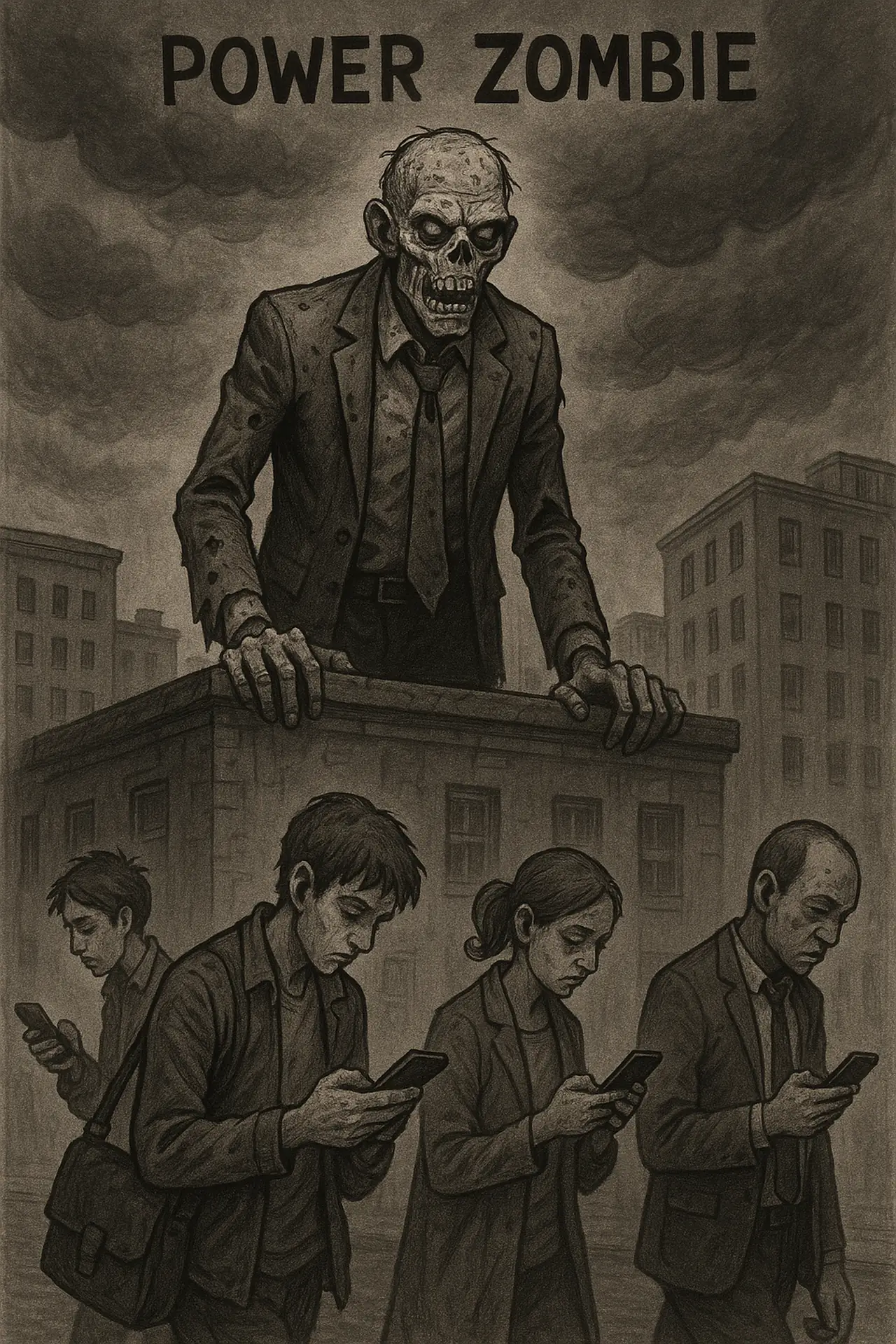Brain-Eating Zombies in the Digital Era.
These hot-button issues fuel outrage, drive headlines, and shape entire election cycles.
But what if the monsters making all that escándalo aren’t really the ones we should fear most? What if the real threat isn’t just on the news — but already in your pocket?
Trust me, underneath that polished iPhone screen lurk far more dangerous brain-eating zombies. They quietly erode the foundation of what it means to be an informed, free-thinking voter.
Enter the Zombie: How Ads and Games Erode Democracy
Welcome to the Zombie Feed

Think about that ad that popped up during your last mobile game — the one promising you a million bucks in an hour. You know it. You’ve seen it. That ad.
That Black boy riding his bike early on Saturday... delivering the morning paper... minding his own business... a summer job!
But then — a bold message suddenly hijacks the screen!
🖐️STOP!
Stop doing that if you want to make real money!
Harmless, right? Just another mobile ad promising you a million if you play bingo for 20 minutes!
C'mon! Turn your goddamn brains on and look closer, my friend. These ads are anything but innocent. They’re engineered to prey on the fantasy of fast wealth, offering a seductive escape while feeding a culture obsessed with instant gratification. Worse, they quietly undermine the value of hard work and erode critical thinking.
Here’s another example — a different ad, same message. Another black boy delivers fast food to a white man in a truck. The boy asks politely for a tip. The man shrugs and shows his empty wallet. Then his phone buzzes. With a sly grin, he offers the boy a holy solution: a holy???? game so he can make quick, easy money. The lesson? Again! Don’t work harder — just gamble smarter.
What’s the Problem with this Scenario?

YOU: Why does it matter if these are just ads sponsored by PayPal and Apple and promoted by superstars like, say, Samuel L. Jackson and Chuck Norris?
ME: No, they are not just ads. Wake the f@#K up!!! It matters because it's not just about a false promise of wealth — it's about reinforcing a toxic belief system the superstars seem to be part of!!!
The boys above, for one, likely from a disadvantaged background - the hood? - are offered a way out. But the escape isn’t hard work, education, or the community. Instead, the so-called solution is gambling disguised as opportunity. The message is clear: success doesn’t come from effort — it comes from shortcuts. And that mindset chips away at the very idea of real, sustainable achievement.
It’s easy to shrug these ads off as harmless distractions — but they’re anything but. They’re part of a larger, hidden machine that rewires how we think, how we measure success, and how we define value. Their goal? To distract, mislead, and condition us to accept shallow promises over real progress. The result is a generation of zombies — passive consumers chasing illusions, instead of developing the skills and critical thinking that democracy needs to survive.
And, when election season arrives? That same conditioning produces a voter who will back any politician selling fantasy over fact — someone promising a sky full of dollars, no matter how empty the offer. Meanwhile, we stay locked in place, focused on the loudest headlines — guns, drugs, immigration — while ignoring the slower, quieter forces that truly threaten democracy. In an age of algorithm-driven distraction, the danger isn’t just what we see — it’s what we no longer think to question.
What are we missing?
The zombies of our modern world aren’t the undead — THEY ARE US. Mindless consumers of misinformation, passive participants in false narratives, we’ve become the walking dead voters. As our capacity for critical thought fades, so does the heartbeat of democracy. Meanwhile, the real threats flourish unnoticed: education collapses, online gambling thrives under the illusion of easy money, and we grow more dependent on hollow fixes that offer nothing real.
We Are Running Late.
It’s time to call out the zombie-making machines for what they are: subtle, relentless forces reshaping our culture under the radar. The danger doesn’t always come through loud headlines — it arrives quietly, through constant distraction and manipulation. It lives in the false promises, the endless scrolling, the erosion of attention and depth. And while we chase clicks and dopamine hits, we lose sight of what actually matters.
We need to wake up — because those in power don’t want us thinking too deeply. If we're chasing quick money or obsessed with the latest scandal, we won’t notice the slow theft of our schools, our voices, and our future. The more uninformed, distracted voters they create, the easier it is to stay in control.
In today’s political and cultural noise, the real monsters don’t come snarling — they smile. They wear tailored suits, speak sweetly, and sell us lies with charm. They don’t need to bite — we hand them our brains willingly.
References
- The Threats of Ads in the Digital Age.
- Dangerous Ads Targeting Children.
- The Gaming Industry’s Lobbying Playbook: Target Kids, Control Policy, Maximize Profits.
- Over Half of Americans Say K–12 Education Is Headed in the Wrong Direction.
- How Video Games Can Interfere with Your Child’s Development.
- Political Polarization and the Attention Economy.
- How Misinformation Is Distorting Democracy.